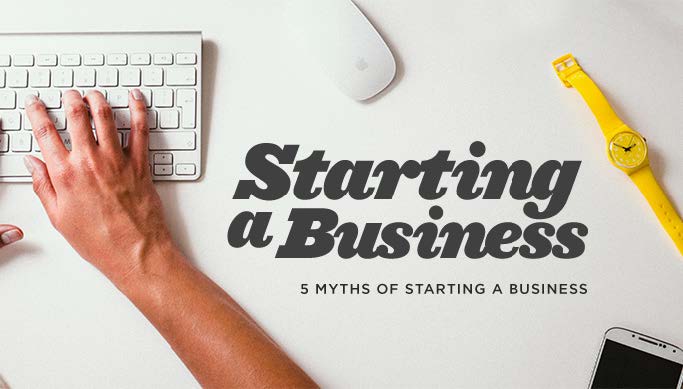
Self-employed? Nonemployers (just like you) make up 75 percent of all U.S. businesses! The new American Dream seems to be shifting from images of white picket fences and cookie-cutter homes to visions of starting and running your own business.
But you may be bogged down by unsubstantiated precautionary tales that seem to perpetuate until someone squashes them. Well, we’re here to stop the rumor mills and debunk these silly myths that may be stopping aspiring entrepreneurs from taking that first step:
Myth: You need experience to start a business.
Reality: No requirements are needed to succeed in business.
A best-selling author once said, “The one thing all . . . celebrated achievers in any field have in common is that they all began their journeys when they were none of these things.”
Moral of the story? Everyone starts somewhere, even if it’s with very little entrepreneurial know-how. Take for example Timothy Ericson and his business partner. These formerly aspiring, now burgeoning, entrepreneurs “started from nothing . . . in an industry that was totally new to [them],” as told to Entrepreneurship.
Years later, with some research, determination, and elbow grease, their business continues to expand—a far cry from their beginning stages of deep uncertainty.
And their story is not the exception.
Just as Ericson and his business partner took it upon themselves to learn from scratch, you can do the same. Our easy-to-read “How to Start a Business” guide will explain everything from choosing a company name to financing your business.
Myth: Incorporating is only for big businesses.
Reality: Incorporating can help small business owners protect their personal assets.
The simplicity of the Sole Proprietorship business type attracts those who aren’t too well-versed in the business world. Once you make your first sale or transaction, you’re considered a Sole Proprietor, with no formal process involved. Yep, that’s it.
Incorporation (the process of forming a legally recognized business in your state) is not required for a Sole Proprietorship, categorizing it as an unincorporated business. This means that your personal assets and your business aren’t legally separate. Instead, they’re considered as one in the eyes of the law.
That may work for you and your business if you’re not worried about being personally liable for your business’s debts and claims. Because as we know in our highly litigious society, there’s always a high possibility for a lawsuit.
What are the other benefits of incorporating? Let’s go through them, shall we? Incorporating can:
- secure your business name
- help build a stronger business
- establish legitimacy
- provide tax benefits
- establish perpetual existence for your business
- protect your personal assets (aka limited liability) from business debts and obligations
Myth: A handshake has the same power as legal documents and contracts do.
Reality: Putting it in writing is the safest way to protect you and your business.
Sometimes you just don’t have that pen and paper available when you’re ready to make an important business deal. Your solution? A verbal contract with a handshake. It’s true that this kind of contract is still valid and legal but is it the smartest decision to make? In most cases, no.
One of the biggest problems you’ll run into is proving the existence of a verbal agreement. Say a business partner went back on his word, the word that was solidified by your joint handshake. In court, you’ll have to find some way to prove your case with no witnesses or evidence to back up your claims of a contract.
The real solution? Put it in writing (and make sure to create copies). In writing, you can set expectations for both parties and write down all the granularities of your agreement without relying on oral dictation that can lead to miscommunication. Plus, it can be one more thing you can cross off your list of worries.
Myth: You don’t need to consult with a lawyer.
Reality: A lawyer can help prevent a future legal mess.
The word “lawyer” usually gets people jumping out of their seats. The first few questions that may naturally pop up may be: “Uh oh, am I in trouble?” or perhaps more fittingly, “How much will it cost?”
But as you know, lawyers are more than just these “scary” legal problem fixers. In fact, they’re here to help you prevent a potential legal mess that may arise. What most people don’t know is that it’s usually far less expensive to consult with a lawyer to ensure your legal work is done properly than it is to hire a lawyer afterwards to fix problems after they happen.
Ultimately, lawyers can help navigate you through the legal world and avoid any fines and penalties. Just ask a lawyer when you’re uncertain because as the old saying goes, “An ounce of prevention is worth a pound of cure.”
You can find a qualified lawyer that’s experienced in your specific legal situation in our lawyer directory. Before you ask a lawyer a question, check out our tip on how to talk to a lawyer.
Myth: You’re too old to start a business.
Reality: Successful entrepreneurs start at any age.
Mark Zuckerberg is arguably the poster child of modernday startups, defined by his innovation and lest we forget—his young age when he founded Facebook. For those who aren’t building a new business straight from their tiny college dorm room, the startup landscape may look more like a playground.
Sure, you may have a few more grey hairs and laugh lines than the next college-dropout entrepreneur might have. But there’s something invaluable that they cannot get without years (and years) of living and working: experience.
That’s exactly what Bill Zinke, an 86-year-old successful business owner, saw: an untapped market of experienced employees. As told to Inc, Zinke explains that “older people possess something younger people lack: namely experience, expertise, judgment, and performance,” which is “why older people who create new businesses have a better rate of success.”
Recognizing the lack of older people in the entrepreneurial space, he founded the Center for Productive Longevity. Its goal? To encourage older people to remain productive as they age by taking advantage of their years of work experience and starting a business.
You may feel like you’re late to the game but when we look at the history of successful innovators, you’ll find yourself surrounded by good company. For example, did you know that Sam Walton didn’t start Wal-Mart Stores until he was 44? And what about model-turned-home-decorating royalty Martha Stewart? She didn’t launch her empire until she was 35.
Imagine if Martha Stewart let her ageist (and defeatist) thinking discourage her from taking that first step in building a billion-dollar empire!
Check out these “late bloomers” who started a successful business and get inspired:
- Charles Flint didn’t start IBM until he was 61
- Vera Wang didn’t start designing clothes until she was 39
- Reid Hoffman didn’t start LinkedIn until he was 36
- Joseph Campbell didn’t start Campbell Soup until he was 52
- Fauja Singh didn’t start running marathons until he was 89
As Zinke explains, “I guess I’m an example [of a successful business owner of any age.] And I do not think I’m an anatomical wonder. I simply reflect the reality of demographic change in America.”
Ready to get started?
Success begins with the first step: preparation. We have the tools and resources you need:
“How to Start a Business” guide








